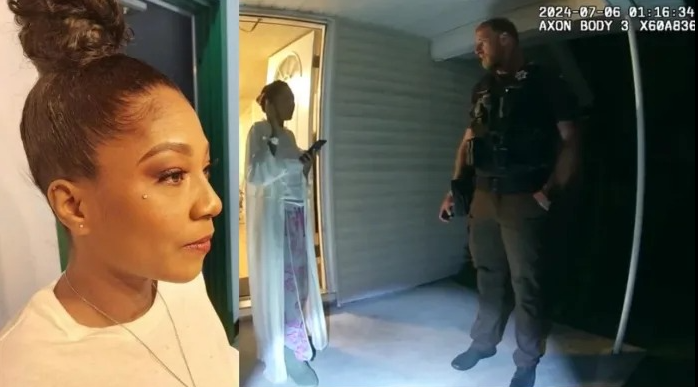On Friday, the autopsy report of Sonya Massey, a 36-year-old Black woman who was fatally shot in her Illinois home, was released, providing crucial details about her tragic death. Massey was killed by a sheriff’s deputy, now dismissed and facing charges for her death. The autopsy confirmed that she died from a gunshot wound to the head. Additionally, the report highlighted other injuries she sustained, including minor blunt force injuries to her right leg. At the time of her death, Massey weighed 112 pounds. These findings add layers to an already complex and emotionally charged case, sparking discussions about police conduct, racial dynamics, and justice.
Sonya Massey’s death has left a profound impact on her family, friends, and the broader community. Known for her warm personality, dedication to her family, and active role in her local community, Massey was a beloved figure. Her sudden and violent death has not only devastated those who knew her but also galvanized public outcry and demands for accountability.
The incident occurred on a quiet evening in her home, situated in a typically serene neighborhood. According to initial reports, the sheriff’s deputy, whose identity has been withheld pending further investigation, was responding to a call at Massey’s residence. The exact nature of the call remains unclear, but what transpired subsequently led to a tragic and fatal encounter. Witnesses and neighbors recall hearing a series of loud noises, followed by the arrival of multiple law enforcement vehicles.
The autopsy, conducted by the county medical examiner, confirmed that Massey was shot just beneath her left eye, a wound that proved fatal. The report also noted “minor blunt force injuries” to her right leg, raising questions about what happened in the moments leading up to the shooting. The detailed examination provided crucial evidence that will likely play a significant role in the ongoing investigation and legal proceedings.
Public response to Massey’s death has been immediate and intense. Vigils and protests have been held, with community members and activists calling for justice and systemic changes to law enforcement practices. The case has drawn the attention of national civil rights organizations, which have pledged support to Massey’s family and are advocating for a thorough and transparent investigation.
Sonya Massey’s family has expressed their deep grief and frustration, struggling to understand how a routine police response could result in such a devastating loss. They remember her as a loving mother, sister, and friend, whose life was cut tragically short. In a statement, her family emphasized their desire for justice, not only for Sonya but for all victims of excessive use of force by law enforcement.
The now-fired sheriff’s deputy involved in the shooting has been charged with manslaughter, a decision that came after an internal investigation and review by the district attorney’s office. This charge indicates that authorities believe the deputy acted unlawfully, although the full details of the investigation have not been publicly disclosed. The legal process is expected to be lengthy and closely watched, with significant public interest in the outcome.
The broader implications of this case cannot be ignored. Sonya Massey’s death has become a symbol of the ongoing struggle against police violence and racial injustice in the United States. Her name is now among those invoked in calls for reform and accountability, highlighting the urgent need for changes in how law enforcement interacts with communities, particularly those of color.
In the wake of the autopsy report, community leaders have reiterated their demands for comprehensive police reform. Proposals include better training for officers in de-escalation techniques, increased transparency in police operations, and the implementation of body cameras to provide clear records of interactions between law enforcement and the public. Additionally, there are calls for independent oversight bodies to investigate incidents of police misconduct.
The legal proceedings against the former deputy will likely include a detailed examination of the circumstances leading up to Massey’s death. This will involve scrutinizing police protocols, the deputy’s actions, and the overall response by law enforcement. Legal experts anticipate that the trial will delve into critical questions about the use of force, decision-making under pressure, and the deputy’s adherence to departmental policies.
Sonya Massey’s community continues to honor her memory through various initiatives aimed at promoting justice and equality. Scholarships in her name have been established, aiming to support young people from underprivileged backgrounds in pursuing their educational goals. Community centers have organized forums and workshops focused on civic engagement, encouraging residents to become more involved in advocating for their rights and holding public institutions accountable.
As the legal process unfolds, there is a palpable sense of urgency and determination among those seeking justice for Sonya Massey. Her death, while a tragic loss, has galvanized a movement dedicated to ensuring that such incidents are prevented in the future. The focus remains on not only seeking accountability for her death but also on fostering a society where every individual is treated with dignity and respect by those sworn to protect and serve.
The story of Sonya Massey is a stark reminder of the real and ongoing issues of police violence and racial injustice. It underscores the need for continued vigilance, advocacy, and reform to address these deep-seated problems. As her family and community navigate the painful aftermath of her death, they are supported by a broader movement committed to creating a safer and more just society for all.
In conclusion, the release of the autopsy report on Sonya Massey has provided critical insights into the circumstances of her death, confirming that she died from a gunshot wound to the head and revealing additional injuries. This information is pivotal as the legal case against the former sheriff’s deputy progresses. The impact of her death resonates far beyond her immediate community, highlighting systemic issues that require urgent attention and action. Sonya Massey’s legacy will endure through the efforts of those who continue to fight for justice, equality, and meaningful change in the realm of law enforcement and beyond.
